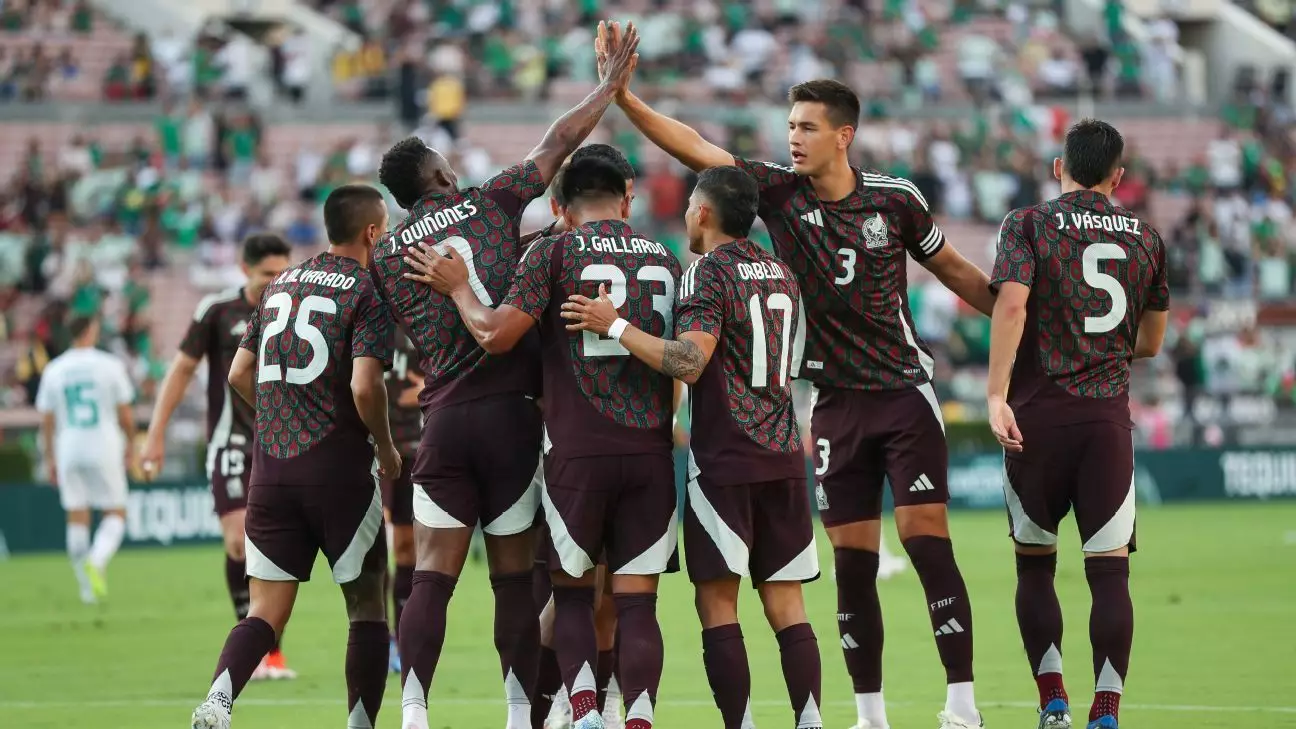As the Mexican national football team embarks on a new journey under the guidance of head coach Javier Aguirre, there is a sense of cautious optimism surrounding the squad. Aguirre, who has previously managed El Tri during two spells, has kicked off his tenure with a series of friendly matches that showcased both potential and areas for growth. While the results so far—a 3-0 victory over New Zealand and a 0-0 draw against Canada—do not immediately quell the skepticism among fans, there is a palpable shift in the team’s energy and motivation that could serve as a foundation for future success.
In a landscape where Mexican football has faced criticism for underperformance, especially following a disappointing exit from the Copa América, Aguirre’s initial games have revitalized the squad’s spirit. Players like Luis Romo and Orbelín Pineda emerged as vibrant figures, evincing a hunger that had previously been lacking. The 3-0 defeat of New Zealand demonstrated a renewed sense of drive, with the team displaying an aggressive approach and a willingness to engage in physical play. An increase in fouls against Canada, where they committed 13 fouls in just the first half, indicated a shift from complacency to a more dynamic engagement on the pitch.
Aguirre, known for his charismatic leadership style, seems to be instilling confidence in his players. As noted by sporting director Duilio Davino, Aguirre’s character could be instrumental in unlocking the potential of Mexican players, urging them to showcase their best performances. The coach’s ability to motivate while enforcing a disciplined structure could be the antidote to the stagnation experienced under previous management.
Despite hopes for a prolific offense, the international window showcased persistent challenges, particularly regarding the striking department. Santiago Giménez, widely regarded as a burgeoning talent, continues to struggle with finding the net for his country, with a drought extending back over a year. In the friendlies, he came close but was thwarted on crucial attempts against Canada, further exacerbating concerns about his finishing ability on the international stage. Aguirre’s reassurance that he does not prioritize individual goal-scoring achievements is a double-edged sword; on one hand, it relieves pressure from the players, but on the other, it raises questions about the team’s capacity to convert opportunities into goals.
Moreover, while Aguirre has shown competence in organizing the defense—registering two clean sheets—it is crucial for the team to balance defensive stability with offensive potency. Goals are essential for momentum and morale, and a remedy must be found to ignite their prowess in front of the goal.
The defensive strategies employed by Aguirre have been commendable thus far. El Tri availed themselves of a tight defensive framework that has limited their opponents’ scoring opportunities. Against both New Zealand and Canada, the team showcased a focused backline, with players like César Montes and Israel Reyes proving to be formidable in their defensive duties. Holding Canada to just an expected goals (xG) of 0.26 is a testament to their organization and readiness.
The presence of assistant coach Rafa Márquez, a revered figure in Mexican football, enhances this defensive solidity. Márquez’s experience and tactical know-how contribute significantly to the team’s improved backline. His mentorship can help cultivate a sense of cohesion and discipline within the defensive unit, which is vital to the team’s aspirations for upcoming competitions.
While the team’s performance on the pitch is crucial, the support from their fanbase remains equally significant. With the quality of play noticeably in flux, there is a question of whether the fans will rally behind the team again. Attendance figures for recent friendlies were telling; even in Texas, viewed as a second home for El Tri, crowds remained below expectations. The turnout for the game against New Zealand was particularly disappointing, and only slightly better against Canada.
External factors, such as extreme heat and midweek scheduling, may have contributed to lower attendance. However, it’s crucial for Aguirre to engender a revival of excitement among supporters. Building a successful and entertaining brand of football will help reconnect the team with its passionate fanbase, igniting enthusiasm that could serve as the backbone for future success.
While the early signs under Aguirre are promising, the journey is just beginning. With phases of motivation, tactical organization, and a quest for goal-scoring mastery underway, Mexico’s national team is at a pivotal moment. The road ahead may be fraught with challenges, but the potential for resurgence is tangible. It is now up to Aguirre and his squad to deliver not just to the scoreboard, but also to their ardent supporters.


Leave a Reply